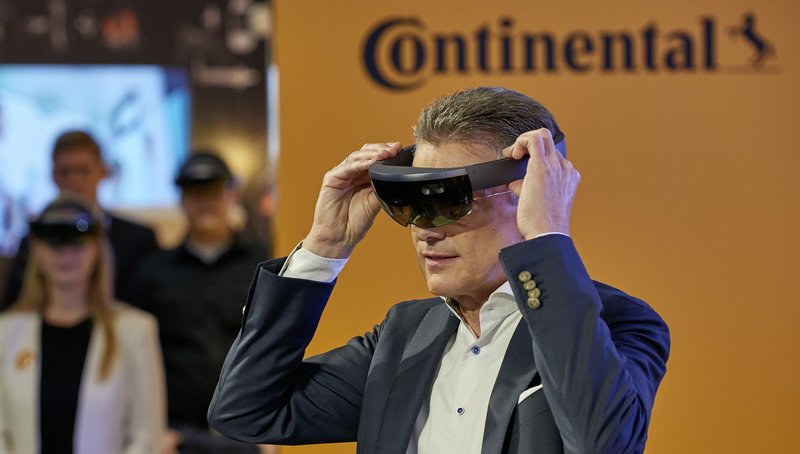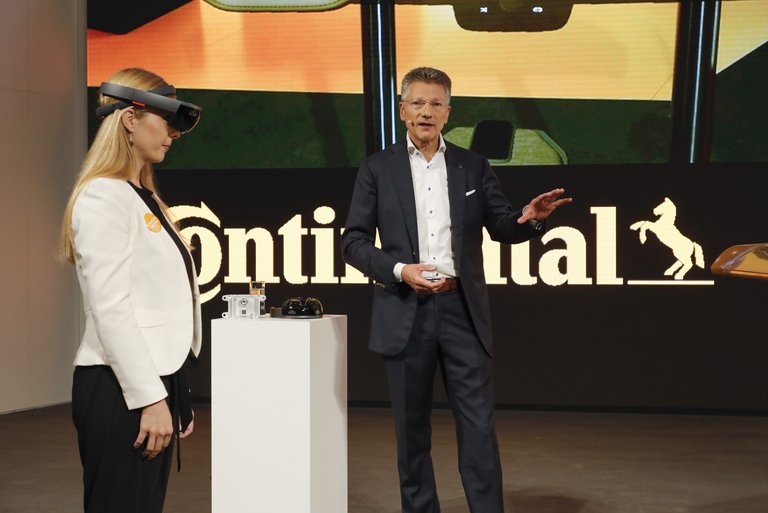Inventiveness, not Quotas – Continental Focuses on Innovations for Successful Future Mobility
- CEO Dr. Degenhart: “Our cars will increasingly become our offices and front rooms”
- Development goal: Innovations for safe, clean, connected and affordable mobility that millions of buyers are demanding
- Degenhart speaks out against quotas for electric vehicles: “Innovation is far more persuasive than government intervention”
- Continental expects the global market for automated driving technology to be worth over €30 billion by 2025
- In the coming years, Continental will increase the portion of its digital sales in the three Automotive divisions to 70%
- Technology company confirms outlook for fiscal 2017
Hanover, September 12, 2017. At its IAA press conference, the technology company Continental emphasized the importance of innovation in the fields of automation, electrification and connectivity and stated that cooperation between industry and politics is more important than ever. “This is because the big goals such as zero accidents in road traffic, clean air as well as comfortable and affordable driving can be achieved only by working together at an interdisciplinary level,” declared Continental CEO Dr. Elmar Degenhart. He emphasized the importance of innovation and inventiveness over technological specifications and quotas.
He also said that Continental is focusing on strong partnerships inside and outside the automotive industry. “Sharing ideas helps to create added value,” said Degenhart, underlining Continental’s commitment to forging partnerships.
With the advent of new technologies, Continental considers greater vehicle diversity to be a real possibility in the future. “Vehicles will become our offices and front rooms – our living spaces on wheels,” said Degenhart, looking to the future, before adding: “This will turn into a multi-billion-euro market with additional business potential for Continental in the areas of assisted and automated driving. Our digital sales of electronics, software and sensors will continue to grow considerably.” Today, this forms 60 percent of the business of the three Automotive divisions in the company. Over the coming years, this will increase to 70 percent, he explained.
“Greater environmental protection and fewer accidents can be achieved only when state-of-the-art solutions are deployed on a large scale,” said Degenhart. “It is not possible to use political means to enforce acceptance for new technologies. When it comes to electric vehicles, for example, purchase incentives are insufficient. We don’t think that state-imposed quotas for the share of electric vehicles in a manufacturer’s fleet make sense. “Innovation is far more persuasive than government intervention.”
Continental confirms outlook and shows growth opportunities through services
Degenhart confirmed the forecast for the current business year at the press conference. “We can confirm our outlook for fiscal 2017: sales in excess of €44 billion and an adjusted EBIT margin of more than 10.5%. We are continuing to enjoy profitable, above-average growth,” said Degenhart. The CEO referred to Continental’s additional growth potential through services for mobility: “Continental builds solutions that end users accept and that help them to move forward – efficiently, comfortably, affordably and on time.”
Three innovation streams: assisted and automated driving, e-mobility and connectivity
Degenhart outlined a range of innovations from Continental that help to overcome the major challenges in the automotive industry.
The cockpit displays of the future will adapt not only to the preferences of the driver but also to the requirements of the driving situation – and they will do so intuitively, intelligently and interactively.
What’s more, electric motors will become smaller, lighter and more affordable. Take Continental’s highly integrated drive, for example, which is scheduled to go into production from 2019 and combines the transmission and electronics in a single module at a very low weight. “A compact 75-kilo power pack for 150 kilowatts” is how Degenhart described the drive, which is now ready for production and whose power can even be increased to 320 kilowatts.
Degenhart regards battery cell development as a matter of prime importance for the breakthrough of e-mobility: “Today's lithium-ion batteries are too heavy, too large, too weak and too expensive. Solid-state battery cells are quicker to charge and are safer. These are expected to be available for production after 2023 and, according to experts, will see a dramatic reduction in costs – from the current level of around €200 per kilowatt hour to less than €100. This means that an electric vehicle with battery storage of 75 kilowatt hours would have a range of around 500 kilometers and cost around the same as a diesel vehicle to run. This is decisive in terms of finding more acceptance for this technology among purchasers and users.”
New sensors and the associated control units are ultimately paving the way for the next stage in automated driving. By 2025, Continental is expecting the global market for automated driving technology to be worth more than €30 billion, which is roughly twice the figure expected in 2020. “Continental currently has a global share of around 15 percent in the global market for advanced driver assistance systems alone. We see clear further potential here,” said Degenhart with optimism.
Please click here for the remarks of the Executive Board Chairman Dr. Elmar Degenhart - pdf (223KB) at the IAA 2017.












